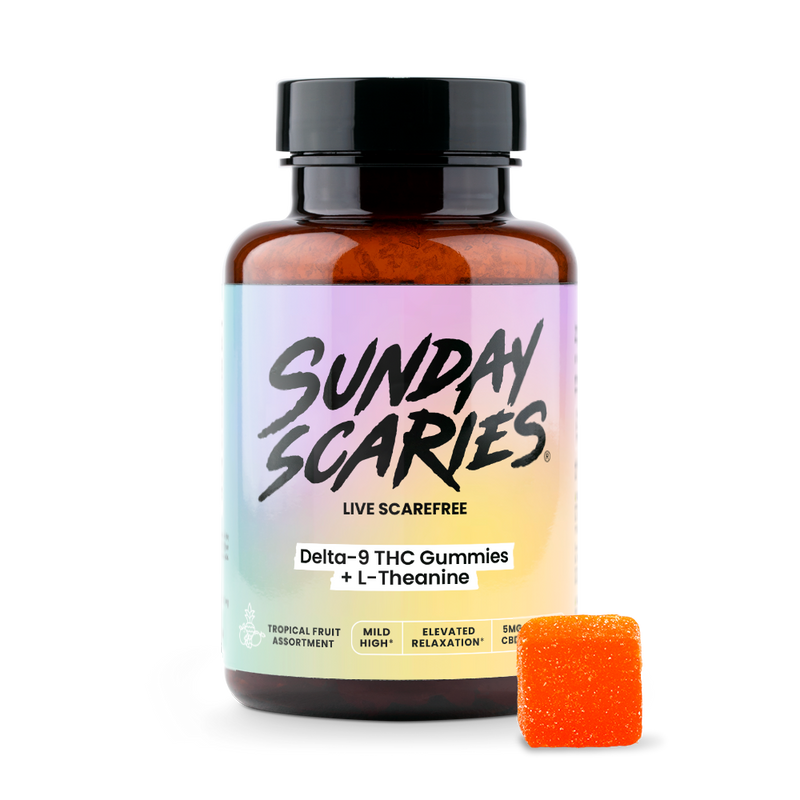
Can THC Gummies & Edibles Cause Diarrhea?

While it's very rare, yes, THC gummies can cause diarrhea in some individuals due to the effects of THC on the digestive system and certain ingredients like sugar alcohols or oils used in the gummies.
THC gummies for sale are popping up everywhere online. This popular form of cannabis edibles have been embraced by many for their ease of use, discretion, and precise dosing.
However, as with any consumable, users may experience certain side effects.
Among the various concerns is whether THC gummies can cause diarrhea.
This article explains into this issue, exploring the potential mechanisms, anecdotal evidence, and scientific perspectives surrounding this question.
Understanding the Gastrointestinal System's Reaction to Cannabis Edibles
To understand how THC gummies might cause diarrhea, it’s essential to first grasp how edibles interact with the gastrointestinal (GI) system.
Unlike smoking or vaping cannabis, where THC is absorbed through the lungs, edibles are ingested and processed by the digestive system.
The journey begins in the stomach, where the gummies are broken down, and the THC is absorbed into the bloodstream through the liver. This process not only alters the way THC affects the body but also has the potential to impact the digestive system differently.
The digestive system is highly sensitive to various substances, and its response can vary greatly depending on the individual's physiology, the ingredients in the gummies, and even the amount consumed.
When the GI system encounters something it deems new, irritating or foreign, it may react by speeding up the digestive process, which can lead to diarrhea.
This is a defense mechanism to quickly rid the body of the perceived irritant.
It's important to know that while diarrhea is obviously an unwanted potential side effect, it's extremely rare that users report getting it.
Ingredients in THC Gummies That May Contribute to Diarrhea
Beyond THC, the ingredients used to make gummies can also play a significant role in gastrointestinal issues.
THC gummies typically contain a mixture of sugars, gelatin or pectin, artificial or natural flavorings, and other additives.
Some of these ingredients are known to cause digestive disturbances in sensitive individuals.
Sugar Alcohols:
Many gummies, including THC varieties, contain sugar alcohols such as sorbitol, xylitol, or mannitol, which are used as sweeteners. These compounds are notorious for causing digestive issues, including diarrhea, especially when consumed in large quantities.
Sugar alcohols are not fully absorbed by the body and can ferment in the colon, leading to gas, bloating, and diarrhea.
If you want to avoid sugar alcohols, buy delta-9 gummies online that have a cleaner formula and use natural sugar.
Gelatin:
Gelatin, a common ingredient in gummies, is generally well-tolerated, but some individuals may have difficulty digesting it. This could potentially cause minor digestive issues, including diarrhea, especially in those with a sensitivity to animal-derived proteins.
If you want to avoid gummies with animal-derived ingredients, opt for vegan gummies that are normally made using pectin and are known for being easier on the stomach.
Artificial Colorings and Flavorings:
Some individuals are sensitive to artificial colorings and flavorings found in many gummy products. These additives can sometimes cause gastrointestinal distress, including diarrhea, in sensitive individuals.
While many brands use artificial colorings and flavorings to showcase a more vibrant-colored gummy and to make the gummy look more visually appealing, if you have stomach sensitivity you may want to sacrifice the visual appeal and taste for natural additives.
Oils and Fats:
Some THC gummies are made with oils, which, in certain forms, can act as a laxative.
For example, MCT oil, often used as a carrier oil in edibles, can lead to loose stools and diarrhea, especially when consumed in higher doses.
Vegetable oil is usually lighter on the stomach and isn't as foreign as a substance as MCT oil is.
THC's Impact on the Digestive System
THC itself, the active compound in cannabis, can influence the digestive system in several ways. When consumed in the form of edibles, THC is metabolized by the liver into a potent compound called 11-hydroxy-THC.
This metabolite is more psychoactive than THC and has a longer duration of effect. The process of metabolizing THC can sometimes cause digestive side effects, including diarrhea.
Endocannabinoid System and the Gut:
The endocannabinoid system (ECS) plays a crucial role in regulating gastrointestinal function. Cannabinoid receptors are present throughout the digestive tract, and THC interacts with these receptors.
While the ECS is generally involved in promoting gut health, excessive activation of these receptors by THC can lead to disruptions in normal digestive function, potentially resulting in diarrhea.
THC and Intestinal Motility:
THC can affect intestinal motility, the process by which food moves through the digestive tract.
In some cases, THC may slow down motility, leading to constipation, while in others, it may speed up motility, resulting in diarrhea.
The effect can vary depending on the dose, the individual, and their unique endocannabinoid system.
Inflammatory Response:
In some individuals, THC can trigger an inflammatory response in the gut. This inflammation can irritate the intestinal lining, leading to symptoms such as diarrhea.
This is particularly relevant for individuals with underlying gastrointestinal conditions such as Irritable Bowel Syndrome (IBS) or Inflammatory Bowel Disease (IBD), where THC might exacerbate symptoms.
Anecdotal Evidence and User Experiences
Anecdotal evidence from THC gummy users presents a mixed picture regarding the potential for diarrhea. Some users report no digestive issues whatsoever, while a small sample of others have noted varying degrees of gastrointestinal discomfort, including diarrhea.
These discrepancies can often be attributed to factors such as individual tolerance, dosage, and the specific formulation of the gummies.
User Reports:
Many users on online forums have discussed their experiences with THC gummies and diarrhea. While some users attribute their diarrhea to specific brands or formulations, others believe the problem arises from consuming too many gummies at once. This anecdotal evidence suggests that while diarrhea is not a universal side effect, it can occur in certain situations.
- A good rule of thumb is to only eat 1-3 gummies, depending on the desired dose. If your target dose is higher, say 50 mg, you should aim to eat one 50 mg gummy or two 25 mg gummies instead of 10 gummies at 5 mg.
Dose-Dependent Effects:
Higher doses of THC are more likely to cause side effects, including gastrointestinal distress. Users who consume large amounts of THC in a single sitting may be more prone to experiencing diarrhea. It’s also worth noting that regular users might develop a tolerance to THC, potentially reducing the likelihood of such side effects over time.
- Lower doses (typically 2.5 to 5 mg THC) is a great starting point for this. You can always scale up incrementally, but doing so with this dosage of gummy is much easier than buying a 50 mg gummy and cutting it up into tiny pieces on your kitchen counter.
Personal Sensitivities:
Individual sensitivity to both THC and the other ingredients in gummies can vary widely. Some people may have a more sensitive digestive system or an underlying condition that predisposes them to diarrhea after consuming THC gummies.
- If you already have gut issues with other foods or supplements, then obviously there's a much higher risk of getting diarrhea with THC gummies. Again, start with small THC amounts and a lower gummy intake.
Scientific Perspectives and Studies
There is a relative paucity of scientific research specifically addressing the link between THC gummies and diarrhea.
However, studies on cannabis and the digestive system provide some insights into potential mechanisms that could explain why THC gummies might cause diarrhea in some users.
Cannabis and the Gut Microbiome:
Some research suggests that cannabis use can alter the gut microbiome, the community of microorganisms living in the intestines. Disruptions to the microbiome can lead to digestive issues, including diarrhea.
While this research is still in its early stages, it raises interesting questions about how THC and other cannabinoids might influence gut health.
THC and Gastrointestinal Disorders:
For individuals with pre-existing gastrointestinal disorders, the effects of THC can be more pronounced.
Research on cannabis use in patients with conditions like IBS or IBD shows mixed results; while some patients report relief from symptoms, others experience exacerbations, including diarrhea.
So, it probably comes down to every users individual reaction to THC gummies, which, once again, is a reason to begin with a low dose and scale up incrementally.
Psychoactive Effects and Stress Response:
THC’s psychoactive effects can also indirectly contribute to gastrointestinal issues.
Anxiety, stress and paranoia, which can be heightened by THC in some individuals, are known triggers for diarrhea.
This psychogenic diarrhea is a result of the gut-brain axis, where psychological stress manifests as physical symptoms in the digestive system.
At the same time, many users report feeling extremely relaxed and happy why under the influence of THC, which could result in the manifestation of positive physical symptoms.
Could it Be From the Munchies?!
Before we dive into preventative measures and when you should seek medical attention, I first want to touch on the "munchies" first.
The munchies are the wild and obscure cravings you get after consuming THC gummies.
While munchies can be healthy, like veggies or fruits, many users default to unhealthy junk food to satisfy their cravings.
So, if you're making a triple decker grilled cheese with bacon, dipping into ranch dressing and consuming it faster than your future run to the bathroom... this might just be the source of your stomach issues... not the THC gummies.
A good way to test this is to consume a single THC gummy at a low dose (2.5 - 5 mg) and then eat foods you normally would when sober. That way you can pinpoint whether THC is the culprit or whether it's the grease-bomb random food item you chef'd up in your kitchen.
Preventive Measures and Recommendations
For those concerned about the possibility of diarrhea from THC gummies, several strategies can help mitigate the risk.
1. Start Low and Go Slow: The adage "start low and go slow" is particularly relevant for THC edibles. Begin with a low dose (2.5 - 5mg THC in a single gummy) and increase gradually to gauge your body's response. This can help minimize potential side effects, including diarrhea.
2. Choose Gummies with Minimal Additives: Opt for THC gummies that contain fewer artificial ingredients, especially sugar alcohols and artificial flavorings. Natural or organic gummies might be easier on the digestive system.
3. Stay Hydrated: Diarrhea can lead to dehydration, so it’s essential to stay well-hydrated, especially when consuming THC gummies. Drinking plenty of water can help maintain digestive balance. THC often causes 'cotton-mouth' or dry mouth so this shouldn't be an issue with you. Just chug water instead of a 7-11 Slurpee.
4. Monitor Your Diet: Be mindful of your diet when consuming THC gummies. Some foods can exacerbate digestive issues, so consider avoiding known irritants like dairy, caffeine, or highly fatty foods. Also, like we discussed earlier, choose munchies that healthy for you and part of your regular diet versus dominating an entire bag of Flaming Hot Cheeto's.
5. Consult with a Healthcare Professional: If you have a history of gastrointestinal issues or are concerned about the potential side effects of THC gummies, consulting with a healthcare professional can provide personalized advice.
When to Seek Medical Attention
While occasional diarrhea from THC gummies is very rare and usually not a cause for concern, there are instances where it may warrant medical attention.
Prolonged or severe diarrhea can lead to dehydration and nutrient deficiencies, which require prompt treatment.
Persistent Symptoms: If diarrhea persists for more than a few days after consuming THC gummies, it’s advisable to seek medical advice. Persistent symptoms may indicate an underlying issue that needs to be addressed.
Severe Dehydration: Signs of severe dehydration include dizziness, rapid heartbeat, and dark urine. If you experience these symptoms, it’s crucial to seek medical help immediately.
Underlying Health Conditions: Individuals with existing health conditions, particularly those affecting the gastrointestinal system, should be especially cautious. If you have a condition like IBS or Crohn’s disease and experience worsening symptoms after consuming THC gummies, it’s important to consult your healthcare provider.
Conclusion: You're Probably Going to Be Fine
THC gummies are generally considered safe for most users, and there aren't a ton of reports that they cause diarrhea, it's very rare. That being said, they may cause gastrointestinal side effects in some individuals.
The risk of diarrhea may be influenced by the ingredients in the gummies, the dose of THC, and individual factors such as personal sensitivity and underlying health conditions.
For those concerned about this potential side effect, starting with a low dose and choosing gummies with minimal additives can help reduce the risk like our THC gummies for sleep.
Staying hydrated and monitoring your body’s response are also key strategies.
Ultimately, while the possibility of THC gummies causing diarrhea exists, it is not a universal experience, and most users enjoy these edibles without any digestive issues.
So while it's important to be educated, you're probably going to be just fine.
Frequently Asked Questions
Which THC Gummies are Least Likely to Cause Diarrhea?
Sunday Scaries Delta-9 Gummies are the best choice if you're concerned about avoiding gastrointestinal issues. Our gummies are infused with L-theanine, an amino acid known for its calming effects, which helps to counterbalance the psychoactive effects of THC. This balancing act can indirectly reduce the likelihood of stress-induced gastrointestinal issues. Also, our gummies are free from sugar alcohols, which are known to cause digestive discomfort in some people. Finally, instead of MCT oil, we use vegetable oil, a gentler alternative that is less likely to contribute to digestive problems.

 CBD Gummies
Stress Relief
CBD Gummies
Stress Relief
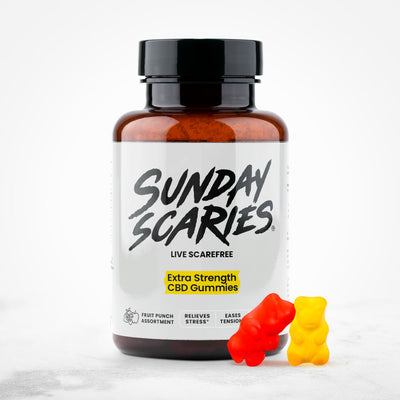 Extra Strength CBD Gummies
Stress Relief
Extra Strength CBD Gummies
Stress Relief
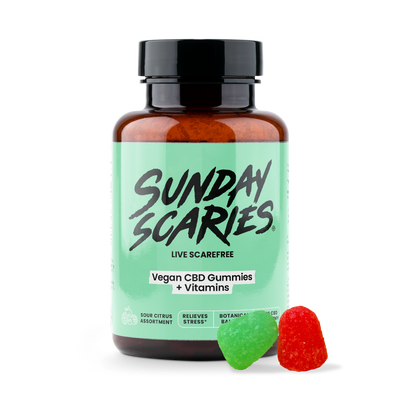 Vegan CBD Gummies
Stress Relief
Vegan CBD Gummies
Stress Relief
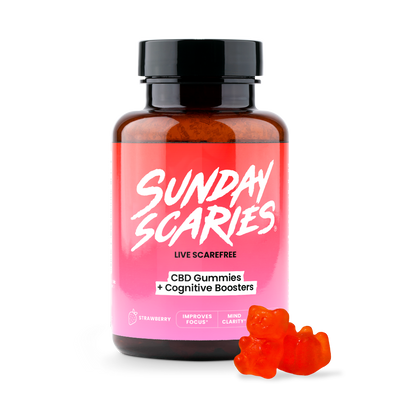 CBD Gummies for Focus
Focus Boost
CBD Gummies for Focus
Focus Boost
 CBD Candy
Mood Lift
CBD Candy
Mood Lift
 CBD Daytime Oil
Stress Relief
CBD Daytime Oil
Stress Relief
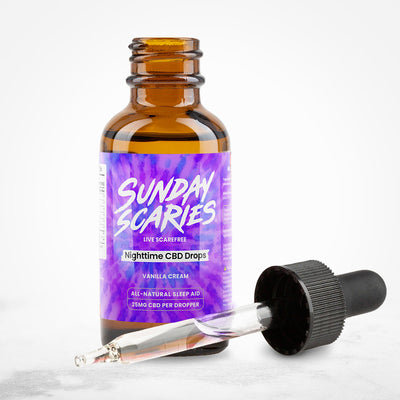 CBD Sleep Oil
Sleep Aid
CBD Sleep Oil
Sleep Aid
 CBD Dog Treats
Stress Relief
CBD Dog Treats
Stress Relief
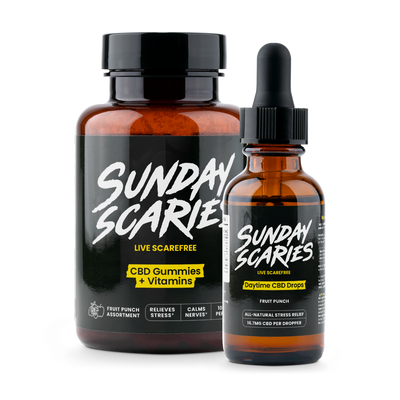 Side Piece Bundle
Stress Relief
Side Piece Bundle
Stress Relief
 Rando Bundle
Stress Relief
Rando Bundle
Stress Relief
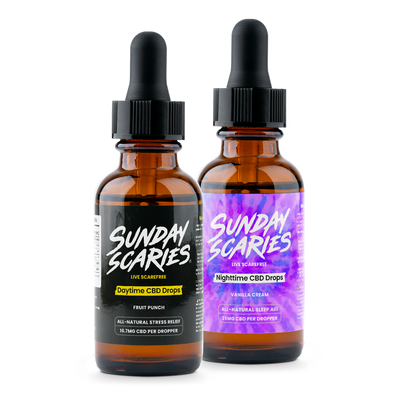 Sunrise & Sunset CBD Oil Bundle
Stress Relief
Sunrise & Sunset CBD Oil Bundle
Stress Relief
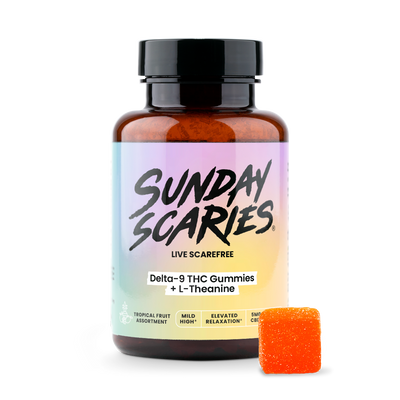 5mg Delta-9 Gummies
Euphoria
5mg Delta-9 Gummies
Euphoria
 10mg Delta-9 Gummies
Euphoria
10mg Delta-9 Gummies
Euphoria
 THC Gummies for Sleep
Sleep Aid
THC Gummies for Sleep
Sleep Aid
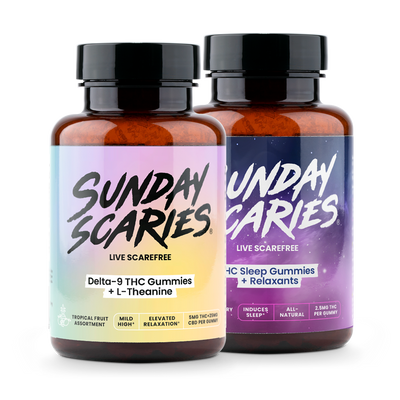 Day & Night THC Gummies Bundle
Stress Relief
Day & Night THC Gummies Bundle
Stress Relief
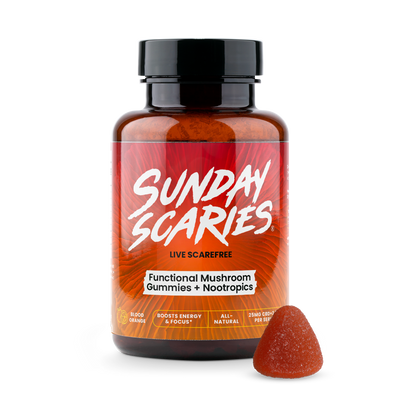 Mushroom Gummies
Focus Boost
Mushroom Gummies
Focus Boost
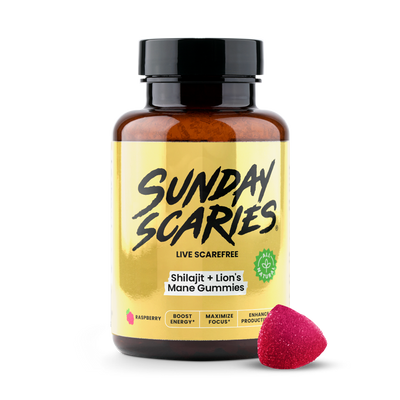 Shilajit Gummies
Focus Boost
Shilajit Gummies
Focus Boost
 Sunday Scaries Hat
Sunday Scaries Hat
 Sunday Scaries Dad Hat
Sunday Scaries Dad Hat
 Sunday Scaries T-Shirt
Sunday Scaries T-Shirt
 Sunday Scaries Pocket Tee
Sunday Scaries Pocket Tee
 Sunday Scaries Tank Top
Sunday Scaries Tank Top
 Sunday Scaries Sweatshirt
Sunday Scaries Sweatshirt
 Sunday Scaries Blanket Jacket
Sunday Scaries Blanket Jacket
 Sunday Scaries Sweatpants
Sunday Scaries Sweatpants

